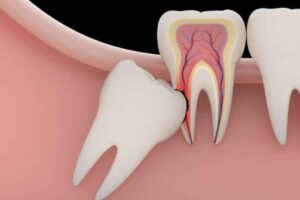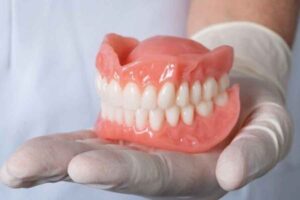How Long Does Root Canal Treatment Take?
- August 18, 2024
- 4:05 pm

Teeth are an important part in supporting health and appearance. However, teeth are not immune to various problems, one of which is damage to the pulp, the soft tissue that contains nerves and blood vessels inside the tooth.
This damage can lead to pain and infection. Fortunately, there is a solution to save teeth, which is root canal treatment.
Have you ever wondered about the length of time for root canal treatment? Well, this article will answer your question completely!
What is Root Canal Treatment?
Root canal treatment, also known as endodontics, is a procedure to remove damaged or infected tooth pulp.
If the infection in the dental pulp is left untreated, it can spread to the tissues surrounding the tooth, including the bone and gums.
Root canal treatment can help preserve your natural teeth and their function, so you can continue to chew, bite, and speak normally.
When is Root Canal Treatment Required?
Root canal treatment is generally recommended in the following conditions:
- Severe tooth pain: Persistent pain, even when eating or drinking, can be an indication of pulp damage.
- Temperature-sensitive tooth: Teeth that are extremely sensitive to hot or cold, especially when consuming food or drinks, could indicate pulp damage.
- Severe tooth decay: If cavities have reached the pulp, root canal treatment may be required to prevent infection.
- Dead Teeth: A tooth that has died (necrosis) due to severe pulp damage also requires root canal treatment.
Baca Juga : Are Artificial Crooked Teeth Safe?
How Long Does a Root Canal Treatment Take?
The length of root canal treatment varies depending on the severity of the pulp damage and the complexity of the tooth.
Usually, one visit to the dentist is required for each stage of treatment. However, in some cases, multiple visits may be required to complete the procedure.
Here are the stages of a root canal treatment visit:
First Stage
Opening access and cleaning the root canal, the dentist will clean the cavity and open access to the root canal. Dead and infected pulp tissue is then removed.
The root canal is cleaned and shaped using special tools to ensure all bacteria and tissue debris are removed.
The root canal is then sterilized with a special material, and then covered with a temporary filling for 5-7 days.
Second Stage
On the second visit, the temporary filling is removed and the root canal is checked again to ensure there is no infection.
The root canal is then filled with a special material (gutta percha) to prevent bacteria from entering.
The pulp chamber and tooth surface are sealed again with a temporary filling for 5-7 days.
Third Stage
If there is no sign of infection and the patient has no complaints, the temporary filling will be replaced with a permanent filling or crown.
The dentist will take x-rays to check the treatment results and make sure there are no problems.
Things to do After Root Canal Treatment
Here are some things to do after root canal treatment:
- Rest: Rest for a few days after treatment. Avoid strenuous physical activity that may worsen pain or swelling. Use a cold compress on the cheek for 15-20 minutes several times a day to help reduce pain and swelling.
- Take Medicine: Take pain medication prescribed by the dentist according to the instructions. Avoid taking nonsteroidal anti-inflammatory drugs (NSAIDs) such as ibuprofen or aspirin, as they can thin the blood and increase the risk of bleeding.
- Soft Foods: Consume soft, easy-to-chew foods for a few days after treatment. Avoid hard, sticky or spicy foods that can irritate the teeth and gums. Make sure to chew food evenly on both sides of the mouth to avoid excessive pressure on the treated tooth.
- Maintain Dental Hygiene: Brush your teeth twice a day with a soft-bristled toothbrush and fluoride toothpaste. Floss once a day to clean between the teeth. Gargle with antiseptic mouthwash twice a day.
- Avoid Bad Habits: Avoid smoking and consuming alcohol as it can slow down the recovery process and increase the risk of infection. Avoid chewing ice or other hard objects as it can damage the treated tooth.
Root canal treatment is a safe and effective procedure to save a damaged or infected tooth.
With proper care, a root canal-treated tooth can last for years.
If you experience symptoms that indicate pulp damage, consult your dentist immediately for proper diagnosis and treatment.
For those of you who are in Bali and have complaints about your teeth or mouth, consult immediately at Omnident Bali – Denpasar.
We are dedicated to being a clinic that provides the best dental and oral health services in Bali at affordable prices.
We continuously strive to provide services that will meet your expectations for the desired results.
Selain itu setiap perawatan yang berbubungan dengan aesthetic atau cosmetic tentunya akan kami lakukan dengan sangat baik, karna kami adalah klinik yang tidak hanya merawat tetapi juga akan memberikan hasil perawatan se-aesthetic mungkin.
Konsultasikan Masalah Gigi Anda Sekarang !
Artikel Terbaru

Cara Alami Hilangkan Bau Mulut

Cara Tradisional Jaga Kesehatan Gigi

3 Penyebab Gigi Tumbuh Tidak Beraturan

Cara Cepat Atasi Sariawan

Cara Praktis Kuatkan Gigi

Anatomi dan Fungsi Gigi
Our Address
Nusa Indah St. No. 80, Sumerta, East Denpasar District, Denpasar City, Bali 80235
Opening Hour:
Monday - Saturday
09.00 am - 01.00 pm & 05.00 pm - 09.00 pm
Copyright © 2025 Klinik Gigi Omnident Bali | Developed by Gleamore.id
